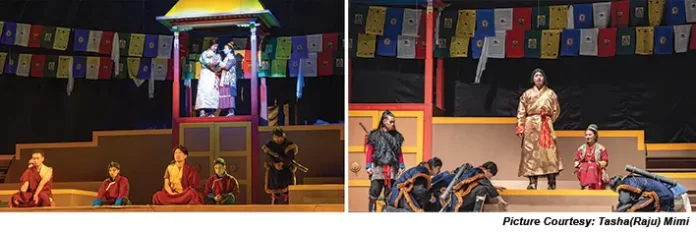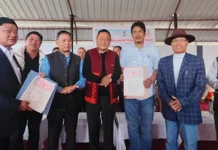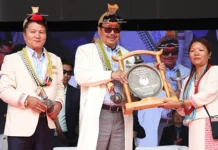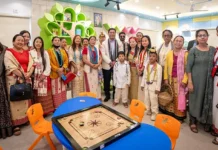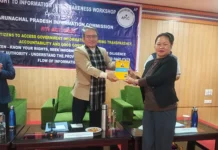[ Amar Sangno ]
ITANAGAR, 23 Nov: The second edition of the Arunachal Rang Mahotsav (ARM) began on Friday with a play depicting the legendary King of Monyul (Mon Region), Gyalpo Kalawangpo, and his journey with the witch Hachangmu (played by Tengam Celine Koyu), as well as his encounter with Queen Drowa Sangmo.
Directed by ARM director and National School of Drama (NSD) professor Riken Ngomle, the play was scripted by Tawang MLA Namgey Tsering and produced by Chief Minister Pema Khandu.
The play portrays the 7th-century tale of King Kalawangpo, whose life was transformed after meeting Queen Khandro Drowa Zangmo (played by Rinchin Lhamu). From a tyrannical and arrogant ruler, the king became compassionate, powerful and purposeful.
The play revolves around the concept of ‘mythical realism,’ showing King Kalawangpo, under the spell of the witch-queen Hachang-mu, who cared little about his subjects or state affairs.
The play opens with a backdrop of Mandal Ghang (present-day Tawang), a sleepy hamlet where the residents lacked vitality and purpose, spending their days in gambling. The king’s tyrannical soldiers looted innocent and poor villagers. This depicted the deplorable state of King Kalawangpo’s rule until he saw and married Queen Khandro Drowa Zangmo. Queen Zangmo’s purpose was to guide King Kalawangpo toward compassion, strength and purpose.
Queen Zangmo was the daughter of an elderly couple, Dramzey Lodre and Dramzey Zema, from the mythical place called Lha Gyari. King Kalawangpo, accompanied by his guards and minister Trinazin (Rinchin Dawa), went on a hunting expedition in the realm of Lha Gyari. After losing his hunting dog in the jungle, the king stumbled upon the old Brahmin couple while searching for it. The king and his guards suspected the couple of having taken his dog, and while searching their house, King Kalawangpo, portrayed by Tawang’s local artist Lobsang Norbu, encountered Queen Zangmo. Awestruck by her beauty, the king proposed marriage to her parents.
The element of surprise, in terms of divine intervention, was clearly seen when King Kalawangpo, played by Lobsang, was struck by the beauty and compassion of Queen Zangmo, played by Rinchin Lhamu.
The play chronicles the transformation of King Kalawangpo’s life after marrying Queen Zangmo. He became a devoted father, husband, and a dedicated disciple of Lord Buddha, propagating peace, compassion and harmony in his kingdom.
However, their happily married life was short-lived when the witch-queen Hachangmu, who had been infatuated with the king, learned of it through her cunning maid Zema Rago (Kelsang Lhamu). Determined to destroy the king’s life, Hachangmu began conspiring to kill Queen Zangmo, Princess Kuntu Sangmo and Prince Kuntu Lekpa.
The king’s fate took a dramatic turn when Queen Drowa Zangmo fled to her divine realm, leaving behind her 13-year-old princess and six-year-old prince. The play captured the emotional turmoil of the frightened queen, forced to leave her family, and the king and children suffering from the loss of their beloved queen.
Stricken by the unbearable loss of his second queen, King Kalawangpo fell into depression and lost his sense of purpose once again. He was captured by Queen Hachangmu.
The play also portrays the unimaginable hardships faced by the two helpless children, separated from their royal parents, and battling daily for survival. Queen Hachangmu continuously conspired to eliminate the king’s royal bloodline.
Divine intervention from Queen Zangmo helped protect her children from Hachangmu’s hired goons. At one point, Prince Kuntu Lekpa (child artist Tenzin Nima) was thrown into the river by the goons, but a large fish saved him from drowning and carried him to the riverbank. This scene depicted Queen Zangmo’s benevolent spirit protecting her son. Director Ngomle again introduced mythical realism, with scenes showing Prince Lekpa riding on a fish and an eagle, guided by a talkative parrot to Pemachen.
The play is a fairytale of the reunion of Prince Kuntu Lekpa and Princess Kuntu Sangmo, separated for years by circumstances and later raised by different people. Prince Lekpa is enthroned as the King of Pemachen.
The play ends with Prince Lekpa taking revenge on Queen Hachangmu. In battle, Prince Lekpa defeats Hachangmu’s army and frees the people from her rule. King Kalawangpo, freed by his son, names him as his successor for Mandal Ghang. Thus, Prince Lekpa becomes the king of both Mandal Ghang and Pemachen.
The play ultimately tells the story of the battle of good over evil, light over darkness, and most importantly, compassion, peace and harmony over anger and tyranny.

